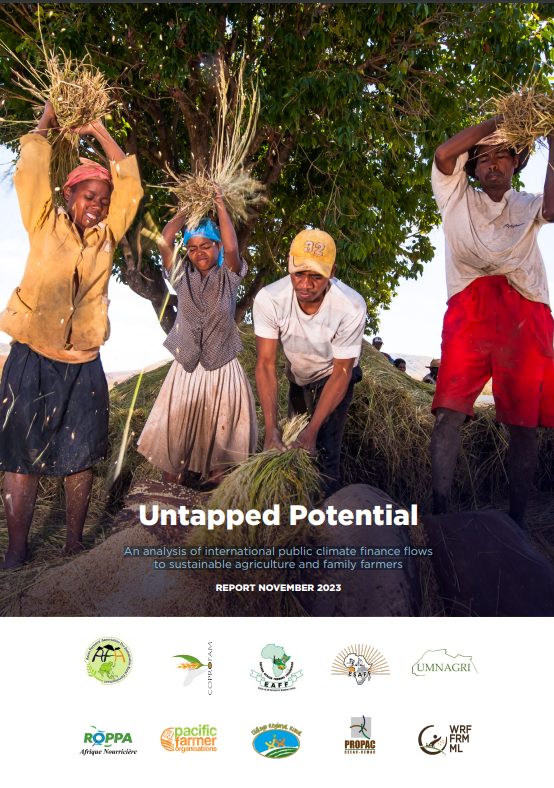Small-scale family farmers are the unsung heroes of the global food system. They produce over a third of the world’s food and are key to climate adaptation, yet new analysis reveals they receive just 0.3% of international climate finance.
Climate change is hitting harvests and driving up food prices across the globe. It has helped push 122 million people into hunger since 2019. We need to create more sustainable and resilient food systems that can feed people in a changing climate, but we can’t do this without family farmers.
Small-scale family farms of less than two hectares produce one-third of the world’s food (32%), while farms of up to five hectares located in developing countries account for more than half of the global production of nine staple crops – rice, peanut, cassava, millet, wheat, potato, maize, barley and rye – and grow almost threequarters of the coffee and 90% of the cocoa.
Family farms are also the backbone of rural economies. Over 2.5 billion people globally depend on family farms for their livelihoods. In Sub-Saharan Africa, where up to 80% of farming is done by smallholder farmers, agriculture contributes 23% to regional GDP.
Family farmers are also key to climate adaptation. They are at the forefront of the shift to more diverse, nature friendly food systems which the Intergovernmental Panel on Climate Change (IPCC) says is needed to safeguard food security in a changing climate. Many are already practising climate-resilient agriculture, including approaches such as agroecology: growing a wider variety of crops including traditional crops, mixing crops, livestock, forestry and fisheries, reducing chemical inputs, and building strong connections to local markets.
Yet, new analysis of international public climate flows by Climate Focus, on behalf of family farming networks representing over 35 million family farmers in Africa, Latin America, Asia and the Pacific, reveals that only a tiny proportion is spent on family
farmers and sustainable agriculture:
- Only 11% of public climate finance was spent on agriculture, forestry and fishing since 2012 – an average of US$7 billion a year. In 2021, US$8.4 billion was spent on the sector – around half the US$16 billion spent on projects in the energy sector.
- Just 2% of international public climate finance – US$2 billion – was directed at small-scale family farmers and rural communities in 2021. This amounts to roughly 0.3% of total international climate finance from both public and private sources. In Sub-Saharan Africa alone, smallholders’ finance needs are estimated at around US$170 billion per year.
- Only a fifth (19%) of international public climate finance for agriculture, forestry and fishing was used to support more sustainable and resilient practices in 2021 (US$1.6 billion). This is a fraction of the estimated US$300-350 billion a year that is needed.
The analysis also shows that 80% of finance for agriculture, forestry and fishing is channelled through recipient governments and donor country NGOs. This often makes it harder for family farmers’ organisations to access funds because of a lack of information on how and where to apply for finance, and complex eligibility rules and application processes. Small-scale family farmers received just a quarter (24%) of spending on the sector in 2021.
Access to finance is symptomatic of a much larger problem which sees organisations representing family farmers sidelined in decision-making on food and climate. At a national level, family farmers’ concerns and proposals are rarely acted upon by governments, while eligibility and financial constraints make it difficult for them to engage in international fora such as the UN Climate Summits.
There is growing awareness of the urgent need to create more resilient and sustainable food systems. Ahead of the UN Climate Summit in Dubai, the UAE Presidency is urging governments to commit to formally integrate food and agriculture into national climate plans for the first time, and scale up and enhance access to international financing for adaptation and transformation of food systems.
COP28 is also expected to agree a Global Adaptation Goal and a process for agreeing new 2030 funding goals that could unlock more support and finance for food and agriculture.
It is vital that governments and funders recognise small-scale family farmers as powerful partners in the transformation of the food system and the fight against climate change. This means ensuring more climate finance goes directly to smallscale family farmers’ organisations and genuinely sustainable climate resilient practices, and that small-scale family farmers have a real say in decision-making on food and climate.




Comments are closed